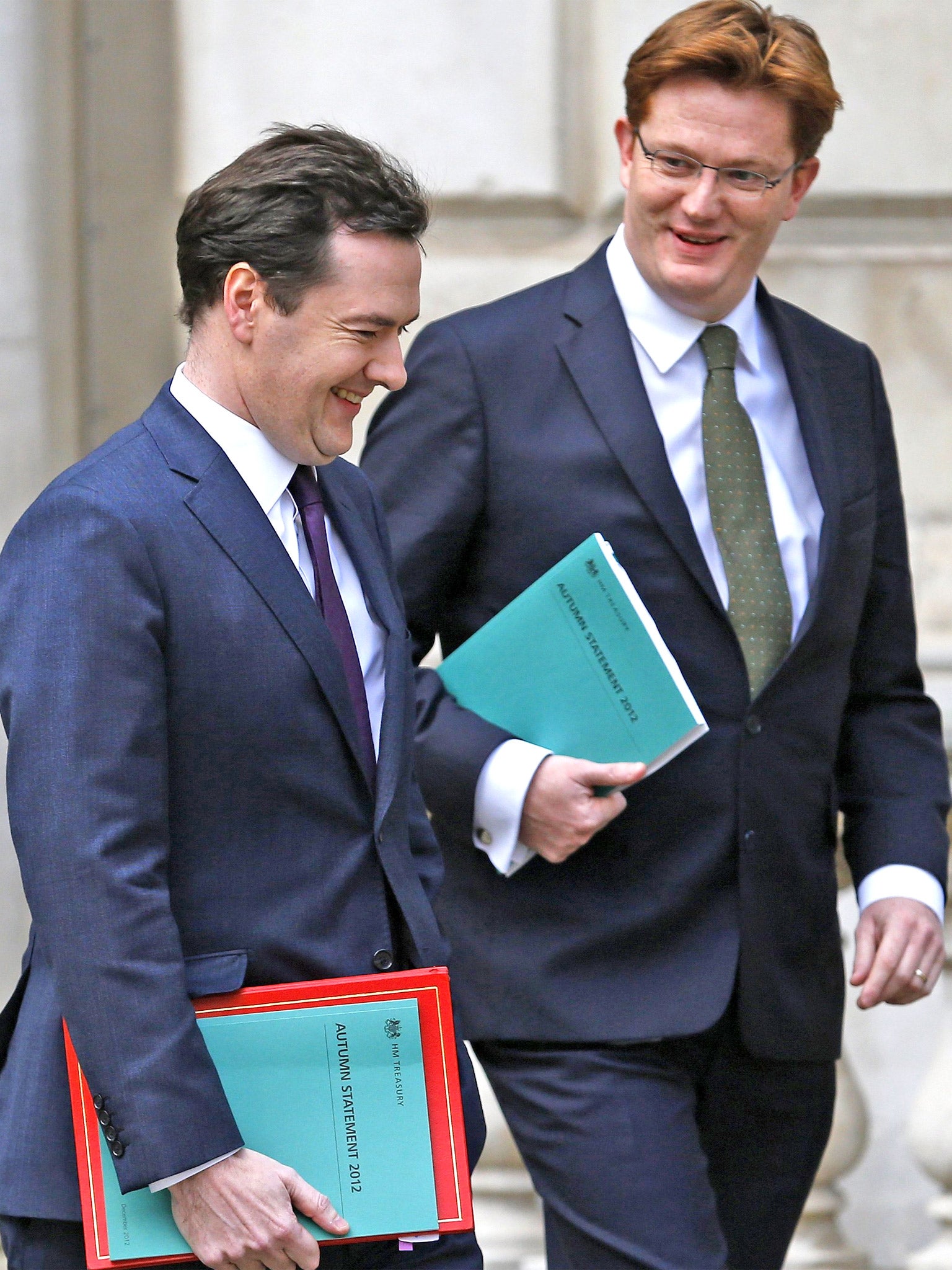George Osborne's raid on middle class: 400,000 forced on to 40p income tax rate
Benefits capped, growth forecasts slashed and austerity plans extended to 2018: Chancellor breaks bad news in Autumn Statement

The Coalition Government will agree an extra £10bn of spending cuts by next June as George Osborne admitted the “age of austerity” would last for at least another six years in a downbeat mini-Budget.
All sections of society were squeezed as the Chancellor admitted he would miss his target to reduce debt as a share of national income by 2015-16. Most working-age benefits will rise by only 1 per cent over the next three years, as the Government breaks the link with inflation.
The Chancellor had little scope to pull a rabbit of his hat. And there was a sting in the tail for those on middle incomes as Mr Osborne’s aides admitted another 400,000 people will be dragged into the 40p higher income tax bracket by 2015, taking the figure to 4.2m. The small print of yesterday’s Autumn Statement showed that this group – a key Conservative target at the next election – will be £117 a year worse off by then.
Mr Osborne admitted that cutting the deficit was taking longer than expected but insisted: “Britain is on the right track.” But he pencilled in a further £4.3bn of spending cuts for 2017-18 to clear the deficit.
The credit rating agency Fitch yesterday warned that the failure of the Chancellor to hit his debt target could lead to Britain being stripped of its AAA credit rating: “In our view, missing the target weakens the credibility of the UK’s fiscal framework, which is one of the factors supporting the rating.”
Tory and Liberal Democrat MPs welcomed two pieces of good news – the 3p-a-litre rise in petrol duty due next month was scrapped; and the amount people can earn before paying income tax, due to rise to £9,205 in April, will now increase by an extra £235 to £9,440. Mr Osborne said the Government was in “touching distance” of a £10,000 threshold, the Liberal Democrats’ flagship policy.
The Liberal Democrats signed up to a further £10bn of cuts for 2015-16 in a move that will worry some of their party activists. They insisted further savings were needed to achieve the Coalition’s mission to cut the deficit.
A government-wide spending review will be completed in the first half of next year, with the Home Office (including the police), the Ministry of Defence, the Ministry of Justice and local government among those likely to come under pressure. The Liberal Democrats will not allow any more welfare cuts on top of the £3.7bn benefits squeeze announced yesterday.
A trade-off between “wealth and welfare” by the two Coalition parties was at the heart of yesterday’s statement. Key decisions were taken at a meeting at Mr Clegg’s home, where he met Mr Osborne and Danny Alexander, the Liberal Democrat Chief Treasury Secretary.
In the private talks, the Chancellor was more open to the Liberal Democrat plans for a mansion tax or higher council tax bands for expensive properties than his public rejection of a new “homes tax” suggested yesterday. But the move was vetoed by David Cameron, who feared a backlash from natural Tory supporters. The Liberal Democrats blocked Mr Osborne’s push for a total freeze in most working-age benefits, insisting on a 1 per cent rise. They also stopped his proposal to end housing benefit for most under 25-year-olds and to limit benefits for children to the first two for new claimants – measures now likely to feature in the next Tory manifesto.
Mr Clegg also vetoed the Chancellor’s plan to bring in regional pay in the public sector, but failed to prise more money out of the Treasury to relieve the burden of childcare costs.
Mr Osborne had to swallow scaled-down forecasts on growth from the Office for Budget Responsibility (OBR), the independent fiscal watchdog, but insisted this was due to the global economy rather than his cuts. Critics seized on OBR figures suggesting that the nation’s “black hole” was barely smaller than when the Coalition took office.
The Chancellor was able to announce a surprise fall in borrowing in 2012-13, but Labour accused him of a sleight of hand by including the expected £3.5bn proceeds from the sale of 4G mobile phone licences.
Labour seized on figures from the House of Commons Library suggesting that a working family with two children and an annual income of £20,000 would lose £279 from April.
Business leaders welcomed the announcement that corporation tax will be cut by 1 per cent to 21 per cent in 2014.
Glossary: Terms of austerity
Deficit The difference between what the Government collects in taxes and what it spends.
Structural deficit The part of the deficit that will not automatically disappear when the economy is growing at a normal rate.
Asset Purchase Facility coupons A pot of money at the Bank of England which will be transferred to the Treasury.
Fiscal mandate Mr Osborne’s self-imposed borrowing and debt rules.
Automatic stabilisers State unemployment benefits that automatically rise, increasing the deficit, when the economy is weak.
Capital spending One-off government investments in physical assets (eg, schools, roads, social housing).
Current spending Wages of nurses, teachers, police and other public employees; spending on benefits.
Tax evasion Illegal tax dodging, as opposed to legal tax dodging, which is called “avoidance”.
Join our commenting forum
Join thought-provoking conversations, follow other Independent readers and see their replies
Comments